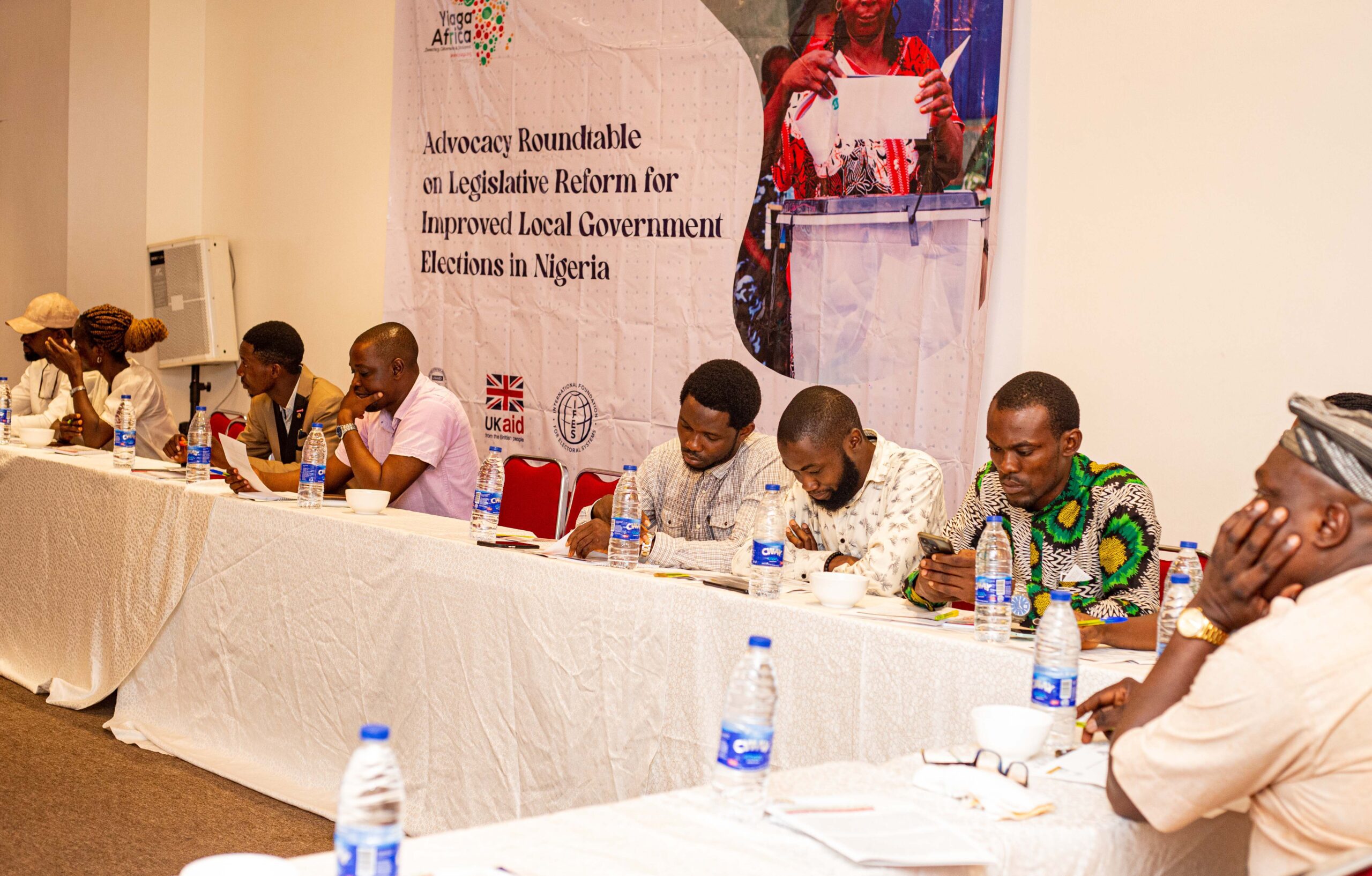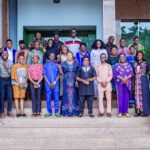COMMUNIQUÉ ISSUED AFTER THE ADVOCACY ROUNDTABLE ON LEGISLATIVE REFORM FOR IMPROVED LOCAL GOVERNMENT ELECTIONS IN LAGOS STATE HELD ON TUESDAY, APRIL 30, 2024 AT WATERCRESS HOTEL, IKEJA, LAGOS STATE.
COMMUNIQUÉ
Preamble
Yiaga Africa, in partnership with the International Foundation for Electoral Systems (IFES), supported by the United States Agency for International Development (USAID) and the Foreign and Commonwealth Development Office (FCDO) held a one-day Advocacy Roundtable on Legislative Reform for Improved Local Government Elections with stakeholders in Lagos State on Tuesday, April 30, 2024.
The Advocacy Roundtable is part of a Civil Society-Led Advocacy to enhance the quality of local government elections and build model State Independent Electoral Commissions (SIECs) in Nigeria. The Roundtable was organized as part of efforts to support the relevant state government institutions, the State Independent Electoral Commission (SIEC), political parties, civil society organizations (CSOs), and the media in strengthening the election legal framework in Lagos State to promote electoral integrity at the local government level.
As a result, a rainbow of civil society actors in the state, media partners, the Lagos State Independent Electoral Commission (LASIEC), political parties, the legislature and representatives from the government deliberated on emerging issues relating to the conduct of local government elections. Following a keynote address by Mr Uche George, a member of Women Advocates Research and Documentation Centre (WARDC) and a presentation on Strengthening the Election Legal Framework to Promote Electoral Integrity at the Local Government Level by Ms Cynthia Mbamalu, Director of Programs, Yiaga Africa, a robust panel discussion took place. The Panel had a diverse representation with Honourable Oladipupo Ajomale; Chairman of Lagos State House of Assembly Committee on LASIEC, Dr. Afolabi Abiodun, Special Adviser to the Governor on Political, Legislative and Civic Engagement, Mr Stanley Kuti, Director, Election Operation Lagos State Independent Electoral Commission (LASIEC), Mrs Temilade Akinade, IPAC Chairperson, Lagos State, Mr Abiodun Ajayi, representing Lagos Civil Society Partnership for Development, (LACSOP) Mrs Safiya Bichi of Yiaga Africa.
Observations
Following the keynote address, Presentations, and Discussions held, the following observations were made:
- The system of local government authority is established in the 1999 Constitution of Nigeria (as amended), ensuring democratic and periodic elections in the local government should remain the priority of every Nigerian and every State Government.
- Section 150 of the Electoral Act 2022 requires that local government elections be conducted in line with the respective sections of the Electoral Act regulating the conduct of the Federal Capital Territory (FCT) Area Council elections.
- Lagos State Local Government Councils are currently run by democratically elected administrators from the last local government elections in July 2021.
- Lagos State is in the process of reviewing and drafting a new Electoral Law, which is an amendment to the Electoral Law, 2008.
- A robust legal framework for LGA elections can guarantee electoral integrity, enable political inclusion and citizens’ participation, and regulate political party conduct at the local level.
- A constitutional amendment guaranteeing Local government autonomy would be the most effective means of ensuring effective and democratic local government administration.
- The lack of a legal framework that sufficiently speaks to the autonomy of the local government in terms of funding and budgetary provisions is a fundamental gap in the effective administration of local government elections and its democratic development.
- The lack of local government autonomy has further entrenched the nature of docility, non-participation, or passive participation of citizens and opposition political parties in local government elections.
- Pending the Constitutional Amendment for full autonomy, the state governments are currently failing in their constitutional mandate to ensure the existence of and functionality of democratically elected local government authority.
- The critical role of the legislature at the National level and the states in establishing a legislative framework for credible elections at the local government level cannot be overemphasized.
Recommendations
Given the above observations, the Lagos CSOs and Media Forum recommend as follows:
- As a matter of urgency, the State Executive should fully constitute the leadership of the Lagos State Independent Electoral Commission to enable the leadership to plan and effectively execute the elections on time. The State government and the State Assembly should ensure that anyone appointed must be non-partisan, professional with experience in election management/administration and a person of integrity.
- The need for a LASIEC Fund to give the State Independent Electoral Commissions (SIECs) the required independence, particularly in their financing, to enable the commission to adequately prepare for local government elections and begin to inspire the people’s trust in the local government election process.
- The proposed amendments in the Lagos State Electoral Commission Law (2008) currently being reviewed by the State House of Assembly should be consistent with the provisions of the 1999 Constitution of Nigeria (as amended) and the Electoral Act 2022 (as amended),
- The Lagos State House of Assembly needs to guarantee that the public is actively involved in the ongoing electoral law review process. They should publicize information about the public hearing and allow citizens to contribute to the amendment process.
- The Lagos State Independent Electoral Commission should strengthen its collaboration with civil society organizations/forums, the media, and political parties by holding periodic briefing meetings and working together to build trust in the local government’s electoral process.
- The Lagos State Independent Electoral Commission should invest in continuous civic and voter education and periodic communication with the public and relevant stakeholders to inspire confidence in local government elections.
- Civil Society Organizations and the Media should provide sustained and adequate voter and civic education and sensitization to encourage increased citizens’ participation in the local government election process.
- Election stakeholders which include CSO’s, international partners, academic and the media should give local government elections the much-needed attention and such as is done during gubernatorial and presidential elections.
- Timing of Elections and Notice of Election: We recommend that local government elections in Lagos State should be held not earlier than 150 days and not later than 30 days before the expiration of the term of office of the incumbent administration. This timeframe will ensure certainty on the timeline for local elections and allow for adequate preparation. In addition, the Law should be reviewed to provide a minimum of 360 days’ notice for local government elections in Lagos state.
- Proper Funding for LASIEC: We call for adequate and timely funding to be allocated to the Lagos State Independent Electoral Commission (LASIEC) to enable it to fulfil its mandate effectively. Proper funding will ensure the commission has the resources necessary to organize free, fair, and credible elections, including voter registration, logistics, and voter education initiatives.
- Tenure Uniformity: We advocate for a uniform four-year tenure of office for local government administrations across Nigeria. Standardizing the tenure duration will promote stability, consistency, and effective governance at the local level, thereby enhancing service delivery and accountability to the electorate.
Conclusion
Local Government elections remains an important part of our democratic process. We urge the government of Lagos State and the Lagos State House of Assembly to consider these recommendations seriously and take appropriate legislative and administrative actions to implement them. By enacting these reforms, we believe that local government elections in Lagos State will become more transparent, inclusive, credible and ultimately enhancing democracy and governance at the grassroots level.
We appeal to the House Committee on LASIEC to work with the leadership of the Lagos State Assembly to review the LASIEC Law ahead of the elections at the local government level. We believe that as the Centre of Excellence, Lagos has an opportunity to be a pacesetter in enhancing the quality of local government elections. We call on all election stakeholders; political parties, CSOs, Media and International partners in Lagos state to work together and assiduously towards achieving the signing into Law of the reviewed State Independent Electoral Commission Law and its operationalization for credible local elections in Lagos State.
Igbega Ipinle Eko Ajumose ni
Greater Lagos, Lagos Rising …
Signed:
Lagos Civil Society Partnership for Development (LASCOP)
Women Advocates Research and Documentation Centre (WARDC)
Centre for Development Communication
EIE Nigeria
Centre for Mmadu on Human Right (C4M)
Committee for the Protection of Peoples Mandate (CPPM)
Abenol Foundation
Yiaga Africa





